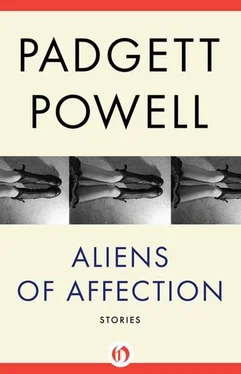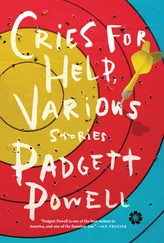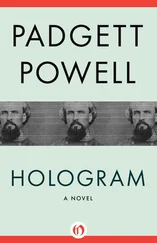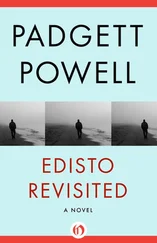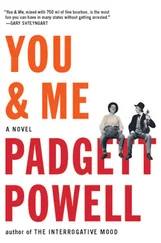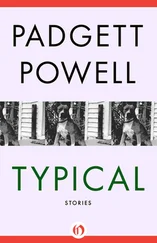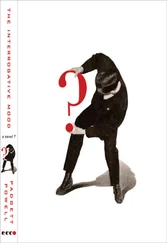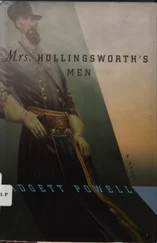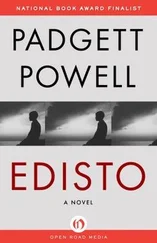Padgett Powell - Aliens of Affection - Stories
Здесь есть возможность читать онлайн «Padgett Powell - Aliens of Affection - Stories» весь текст электронной книги совершенно бесплатно (целиком полную версию без сокращений). В некоторых случаях можно слушать аудио, скачать через торрент в формате fb2 и присутствует краткое содержание. Год выпуска: 2013, Издательство: Open Road Media, Жанр: Современная проза, на английском языке. Описание произведения, (предисловие) а так же отзывы посетителей доступны на портале библиотеки ЛибКат.
- Название:Aliens of Affection: Stories
- Автор:
- Издательство:Open Road Media
- Жанр:
- Год:2013
- ISBN:нет данных
- Рейтинг книги:5 / 5. Голосов: 1
-
Избранное:Добавить в избранное
- Отзывы:
-
Ваша оценка:
- 100
- 1
- 2
- 3
- 4
- 5
Aliens of Affection: Stories: краткое содержание, описание и аннотация
Предлагаем к чтению аннотацию, описание, краткое содержание или предисловие (зависит от того, что написал сам автор книги «Aliens of Affection: Stories»). Если вы не нашли необходимую информацию о книге — напишите в комментариях, мы постараемся отыскать её.
Typical
Typical
Aliens of Affection: Stories — читать онлайн бесплатно полную книгу (весь текст) целиком
Ниже представлен текст книги, разбитый по страницам. Система сохранения места последней прочитанной страницы, позволяет с удобством читать онлайн бесплатно книгу «Aliens of Affection: Stories», без необходимости каждый раз заново искать на чём Вы остановились. Поставьте закладку, и сможете в любой момент перейти на страницу, на которой закончили чтение.
Интервал:
Закладка:
The door to the bar he pounded on the morning of the daughter revelation never opened, not that day or any other. The building itself was bulldozed shortly before the hero laid eyes on Tattie Elaine McGrim Bolio Pearsall, shortly before she laid eyes on Robert Higginbotham, drunk. The hero had by then stopped drinking. Young men who had not yet had the vision of daughters could carry on the inebriant tradition, as far as he was concerned.
Robert Higginbotham had not yet had the vision of daughters. In the strip club he pondered, in fact, something of the opposite: how many of the women, he wondered, were mothers ?
Here is a curious truth with which to leave us: All women are not mothers, but they are daughters all. Through this truth, under its feet as it were, there walks a new blue baby boy, smiling as if he has candy, or as if he is candy. You decide, and decide before you father a daughter or mother a boy. It is only the morose, putative hero who wants to slap the boy, whether because he acts as if he has candy or because he is candy. Only the hero is perverse. You are neither, yet, and your responsibilities, which are neither heroic nor falsely heroic, are nonetheless immense.
Two Boys
ONCE UPON A TIME there were two boys. They were not boys anymore, actually, one forty-something and one nearly forty years old, but they were not stationed properly in Life as were men their age, and they were not going to be properly stationed in Life. They were not going to be bank presidents or lawyers or own car dealerships. One of them had once momentarily seemed properly stationed in Life for a man of his age; he had been a book editor. But he got into an affair with the editor in chief, under whom he worked, and she was the wife of a gangster who regularly employed the services of hit men, and this, this affair, was a very boyish thing to do. So when the editor resigned and ran, or ran and resigned thereby, he was properly a boy again on the street. He felt better all in all about resuming his true identity except that the stress of having pretended not to be a boy with a gangster’s wife who herself knew some of the hit men her husband used had given him cancer of the eyeball. It was his right eye.
The boy with the bad eyeball went through normal hoops trying to not have cancer of the eyeball, second-opinion surfing through waves of options and percentages and knives—
— Not knives, lasers! Why, hold on to that eyeball, in a few years we could save it, if it don’t kill you tomorrow—
It will—
No, it won’t—
— and then he got done with normal white-coat hoops and rag-bond letterhead and he emerged into a little dungeon where a Chinese woman who spoke only Chinese got ahold of him. “Eye poison in,” said the translator he had to take with him. The translator cost more than the Chinese woman who knew how to use the needles and squeeze the earlobes. On the fifth or so visit, well after a man properly stationed in Life would have desisted this quackery, the Chinese woman got down on her knees and thumb-wrestled the boy’s ear-lobe with more than customary vigor and the boy felt what felt like a cord twinging in his head from his ear to the eye in question and then some black stuff began to ooze from the eye in question. “Eye poison out,” the translator said, standing at a good remove. The boy was in a marvel of something like not despair. Despair had been when $200,000 worth of lasers and trips to Sloan-Kettering and having a radioactive ingot strapped to his eye in a dark solitary cell for two weeks and chemo nausea had produced only thin bones and hair loss and more coming-and-going white coats and good opinions and letterhead. For $20, black poison had come out of his eye of its own volition. This was more like it, to a boy. When you have an eyeball that is going to kill you, everything is like unto a boy again. Things begin to make original and final sense again, as they did in the beginning before you grew up and got confused. Or got half-confused, as it is proper to say of the forty-year-old boy who has resisted bank presidency. It would be a good thing, for example, after poison has come out of your eye, to go into your tree house and have a meal of chocolate milk and bologna sandwiches and maybe see a good bird. Not much else is required.
The other boy, who was a bit older, had also gotten himself tenuously properly stationed in Life for a man of his age, and was also suffering for it. He was a college teacher, a position that is not merely proper but that presumes to look askance at, if not down upon, car dealers and lawyers and bank presidents, but maybe not book editors. The college-teacher boy could not identify what was wrong with him but felt it was something like the other boy’s bad eyeball, though larger and vaguer, and he felt it was caused by the same tensions — the strain of posing as a man properly stationed in Life — as had caused the bad eyeball. There was one other link between the two boys: the college-teacher boy’s wife was having an affair. She was not having it with a book editor but with a rug merchant. The college-teacher boy wanted to go with the bad-eyeball boy to the dungeon and tell the Chinese woman to make the rugmaker ooze out of his mind, if that’s where he was. He was prepared for the Chinese woman to tell him the rugmaker was somewhere else, he didn’t care. If she said “Rugmaker in toe” it would be all right as long as she got after the toe. He was prepared to believe in any needles, any herbs, any grains, any tinctures, any thumbholds, any toeholds, any theretofore mystical non-empirical hogwash at all if it would make the rugmaker ooze away back onto the Anatolian plains, where he had frolicked with the college-teacher boy’s wife and where he belonged. “She says all trauma is cellular-deep,” the boy with the bad eyeball told the college-teacher boy. That would have sounded like an exaggeration in the direction of preciousness to the college-teacher boy before he had begun to have a rugmaker inhabit him. Now it did not sound like hyperbole. It sounded like common goddamn sense.
He felt a little sheepish approaching the Chinese woman with the boy who had an actual bad eyeball when all he had was at most a bad heart or bad head. But the bad-eyeball boy could not see out of his eye, and the college-teacher boy could not think with his head, which rather throbbed, or hummed, but did not run. The bad-eyeball boy said, Come on, so they went to the dungeon. If there is anything better than a tree house with chocolate milk and bologna in it, it is an underground fort with a weird woman in it.
On their way to the dungeon, the boys stopped to eat. They liked to eat, and they knew a third boy who was also refusing a proper station in Life (though this third boy was not yet in their league as far as absolute dereliction went), who had forsaken a business-management career for a term in the Culinary Institute of America, which allowed him to say “CIA” once or twice a day, and which allowed him to wear a tall hat and call himself a chef and serve food nobody had ever heard of. On the way to the dungeon the two boys had a turkey and onion confit sandwich, chicken sate with yogurt and cumin and turmeric and garlic, a Black Angus tenderloin with an anchiote-seed salsa, and some White Russian ice cream — advanced tree-house food. It fortified them for the underground. If untoward things happened to either of them in the dungeon at the hands of the Chinese woman, they would not prove faint from want of nourishment. In this — eating well and cleaning their plates — they were being quintessentially good boys. They had both figured out, in fact, that it was only in the territory of eating that what was approved of in the behavior of a boy was approved of still in the behavior of a man. They knew women who tolerated obesity because it was a function of, and an unfortunate evil extension to the higher good of, a hearty appetite. A fat guy who cleans his plate was not merely a fat guy. Much of Life came down, in fact, they had discovered, to divining what women expected of you and allowed of you in order to still think of you as a good boy. The bad-eyeball boy said that the Chinese woman was in this sense a kind of purist, if not goddess.
Читать дальшеИнтервал:
Закладка:
Похожие книги на «Aliens of Affection: Stories»
Представляем Вашему вниманию похожие книги на «Aliens of Affection: Stories» списком для выбора. Мы отобрали схожую по названию и смыслу литературу в надежде предоставить читателям больше вариантов отыскать новые, интересные, ещё непрочитанные произведения.
Обсуждение, отзывы о книге «Aliens of Affection: Stories» и просто собственные мнения читателей. Оставьте ваши комментарии, напишите, что Вы думаете о произведении, его смысле или главных героях. Укажите что конкретно понравилось, а что нет, и почему Вы так считаете.
